 The California Legislature asked its state Supreme Court to direct CA Secretary of State Alex Padilla to place Proposition 49 on the November 8, 2016 ballot. That 2014 statewide referendum --- which didn't make it onto the ballot at the time for reasons explained below --- seeks the advice of the Golden State’s electorate as to whether Congress should propose, and the Legislature ratify, a federal Constitutional amendment that would overturn the U.S. Supreme Court's infamous Citizens United decision.
The California Legislature asked its state Supreme Court to direct CA Secretary of State Alex Padilla to place Proposition 49 on the November 8, 2016 ballot. That 2014 statewide referendum --- which didn't make it onto the ballot at the time for reasons explained below --- seeks the advice of the Golden State’s electorate as to whether Congress should propose, and the Legislature ratify, a federal Constitutional amendment that would overturn the U.S. Supreme Court's infamous Citizens United decision.
Per Prop 49, the amendment should "make clear that the rights protected by the United States Constitution are the rights of natural persons only."
The ballot measure was a result of SB 1272. When originally adopted by the state Legislature it directed then Secretary of State Debra Bowen to place Prop 49 on the November 4, 2014 ballot. However, in August of that year, in response to a legal challenge filed by the Howard Jarvis Taxpayers’ Association (HJTA), the CA Supreme Court directed the Secretary of State to refrain from placing the initiative on the 2014 ballot. The Court, at that time, did not rule on the merits of HJTA's legal challenge. It simply concluded that, as an "advisory measure", as opposed to an actual statute, the ballot initiative's "validity was uncertain." Thus, in 2014, California citizens were denied the opportunity to formally express their views via the ballot on whether Citizens United should be overturned.
At the beginning of this year, almost a year and a half after their original ruling had then "temporarily" nixed the 2014 measure, the state Supremes, in a subsequent ruling [PDF] on the merits of the HJTA complaint, explained that their previous ruling had been based on their assessment that "the balance of hardships from permitting an invalid measure to remain on the ballot, as against delaying a proposition to a future election, weighed in favor of immediate relief." [Emphasis added]. However, according to the Court's new decision, Prop 49 was not invalid. After a thorough examination of the merits, the Court finally ruled that the California Legislature had the lawful authority under both the U.S. and California Constitutions to place this non-binding advisory measure on the ballot.
While the Court did not come out and expressly say it, that essentially means that this same Court had erred when it issued its earlier decision, as proponents of Prop 49 had previously argued. In removing a perfectly valid proposition from the ballot, the Court had intruded upon the Legislature's prerogative to timely secure the advice of the California electorate on November 4, 2014.
With the Court's reversal of it's earlier ruling, one might think that would then allow the measure to finally be placed onto the ballot before state voters in 2016. However...
Too late?
The problem is that the initial enabling legislation, SB 1272, specified placement of the measure on the November 4, 2014 ballot. While not explicitly spelled out, the Court's reference to the word "moot" in it's January 4 decision on the merits this year implied that it would be necessary for the Legislature to re-enact SB 1272 --- specifying a new date --- in order to now place Prop 49 on the ballot. This is a point I noted during a Jan. 6 BradCast discussing the matter.
As suggested by the Legislature’s newly filed petition for rehearing [PDF], SoS Padilla also read the Court's decision on the merits as mandating re-enactment by the Legislature. The Secretary writes that he hopes "the Legislature takes action to place the measure on the ballot in 2016."
Noting time, expense and the fact that its membership had changed since SB 1272 was enacted, the Legislature, in its petition, argues that "it should not have to pass a new measure in order to secure the placement of Proposition 49's advisory question on the November 2016 ballot." The Court has now recognized the Legislature performed a lawful act when it enacted SB 1272. The purpose of that statute was to place the Citizens United advisory question before the voters. The time limitation for placing it on the ballot was merely "directory," the lawmakers' petition argues, and "incidental to the main purpose of the law."
The petition notes that the Court, itself, had prevented placement of Prop 49 on the November ballot in 2014, and that the Court, at the time, said that the decision would mean only a "temporary" delay. That delay, the Legislature contends, was on the basis of the HJTA legal challenge that ultimately --- if a year and a half later --- proved to be "frivolous."
Citing case law, the Legislature argues that "The passage of a statutory deadline relating to qualification of an initiative" is substantively irrelevant, "as long as the court is capable of 'effective relief'". In this case, they write, either the Secretary of State already has a ministerial duty to now place the measure on the ballot, or "the Court should exercise its established judicial power to 'reform' SB 1272 so as to effectuate the Legislature's intent by replacing the words 'November 4, 2014' in the statute with the words 'November 8, 2016.'"
Why it matters
As Brad Friedman observed during the January 6 BradCast, HJTA and the corporate-owned L.A. Times argued that placement of Prop 49 before the voters amounted to little more than "ballot clutter." The Sacramento Bee, on the other hand, opined that the California Supreme Court's initial decision to remove Prop 49 from the November 2014 ballot reflected "arrogance" and a disregard for democracy.
While there may be an occasion where an advisory measure could be marginalized as "ballot clutter," it is difficult to imagine one that is of greater importance than Prop 49. In that regard, it is perhaps useful to repeat the words we published nearly six years ago in "Citizens United: A Case Which Will Live In Infamy":
In Scott, the Court, in service of wealthy Southern landowner/masters, ruled that African-American slaves and their descendants could never be considered "citizens." They were but chattel, the personal property of their owners. The Southern slave master thus had a right to demand the return of his "property" should his property make the very human decision to escape.
It took a bloody civil war and the 13th Amendment to undue the damage the Court wrought by Dred Scott.
Just as the Court in Dred Scott became the legal instrument for a brutal 19th Century inequity by ruling that living, breathing human beings could never be citizens, so the five member Republican majority of the Court in Citizens United has become the legal instrument for a new 21st Century inequity by extending to artificial, inter-generational constructs known as "corporations" the rights that the framers of the Constitution had intended only to apply to living, breathing people who make up the actual citizenry of this nation.
In that article, we cited Noam Chomsky's observation that the political counterpart to a corporation is a totalitarian state. By extending the right of "free speech" to corporations, Citizens United expanded the power of the billionaires at the pinnacle of those totalitarian constructs to be heard in politics --- a power that is denied to most citizens.
For six years in the wake of Citizens United, the billionaire class has abused that power by way of ever-increasing "dark money" used to purchase deceptive, 30-second propaganda slots (aka political ads) and more. Corporate "free speech" now serves more than ever to undermine the core purpose of a "free press" --- the public's right to know.
When he penned our Declaration of Independence, Thomas Jefferson famously observed that governments derive their just powers from the "consent of the governed." Consent is only meaningful when it's "informed." I can think of no greater means by which to measure whether the governed "consent" to the democracy-destroying rule laid down by the radical right-wing majority in Citizens United than a direct vote on Prop 49 by the nation's largest single voting jurisdiction.
Ernest A. Canning is a retired attorney, author, Vietnam Veteran (4th Infantry, Central Highlands 1968) and a Senior Advisor to Veterans For Bernie. He has been a member of the California state bar since 1977. In addition to a juris doctor, he has received both undergraduate and graduate degrees in political science. Follow him on twitter: @cann4ing


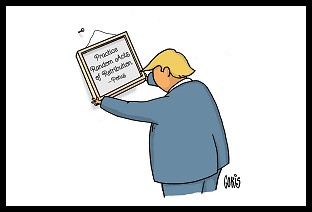 Sunday 'Random Acts of' Toons
Sunday 'Random Acts of' Toons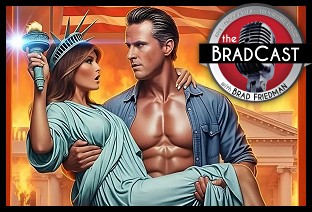 From CA's 'Nuclear Deterrence' Map to Newsom's Trolling to Trump's 'Fascist Theatre' and Beyond: 'BradCast' 8/21/25
From CA's 'Nuclear Deterrence' Map to Newsom's Trolling to Trump's 'Fascist Theatre' and Beyond: 'BradCast' 8/21/25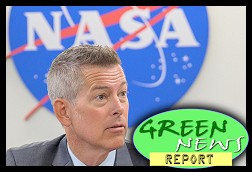 'Green News Report' 8/21/25
'Green News Report' 8/21/25
 On 'Americanism' and Trump's 'Stalinesque' Plot to Whitewash U.S. History: 'BradCast' 8/20/25
On 'Americanism' and Trump's 'Stalinesque' Plot to Whitewash U.S. History: 'BradCast' 8/20/25 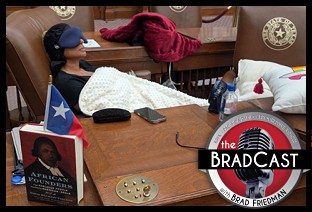 Texas GOP Imprisons Dem State Lawmaker in State House Chamber: 'BradCast' 8/19/25
Texas GOP Imprisons Dem State Lawmaker in State House Chamber: 'BradCast' 8/19/25 'Green News Report' 8/19/25
'Green News Report' 8/19/25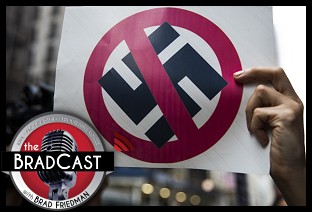 Trump, Nazis and
Trump, Nazis and 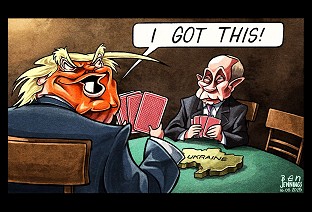 Sunday '
Sunday '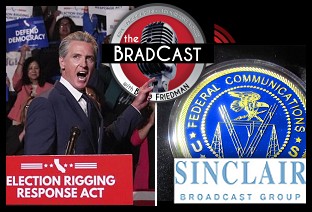 Newsom's 'Election Rigging Response Act'; FCC's License Renewal for Sock-Puppeting Sinclair: 'BradCast' 8/14/25
Newsom's 'Election Rigging Response Act'; FCC's License Renewal for Sock-Puppeting Sinclair: 'BradCast' 8/14/25 'Green News Report' 8/14/25
'Green News Report' 8/14/25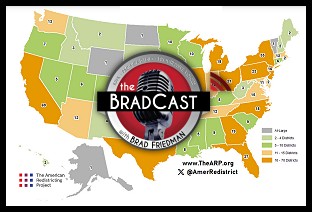 140 New House Reps?: Moving Beyond the Gerrymandering Wars: 'BradCast' 8/13/25
140 New House Reps?: Moving Beyond the Gerrymandering Wars: 'BradCast' 8/13/25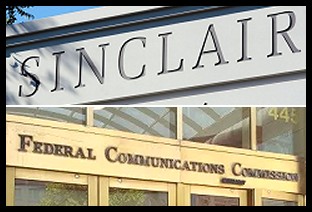 FCC Renews Sinclair TV Licenses Despite Complaint from Petitioner Who Died Waiting
FCC Renews Sinclair TV Licenses Despite Complaint from Petitioner Who Died Waiting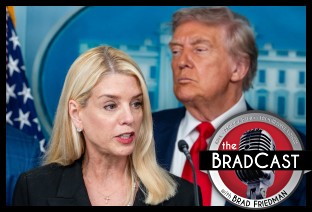 It's Not About the Rule of Law, It's About Authoritarian Control: 'BradCast' 8/12/25
It's Not About the Rule of Law, It's About Authoritarian Control: 'BradCast' 8/12/25 'Green News Report' 8/12/25
'Green News Report' 8/12/25 After Vaccine Cancels, CDC Shooting, Former Officials Want RFK Out: 'BradCast' 8/11/25
After Vaccine Cancels, CDC Shooting, Former Officials Want RFK Out: 'BradCast' 8/11/25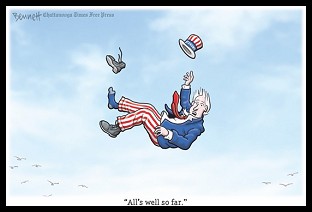 Sunday 'All's Well' Toons
Sunday 'All's Well' Toons 'Green News Report' 8/7/25
'Green News Report' 8/7/25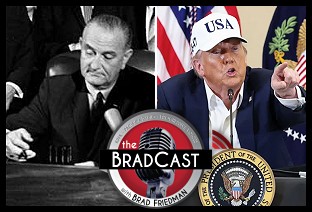 Trump Wars Against Greem Energy, Democracy on VRA's 60th: 'BradCast' 8/7
Trump Wars Against Greem Energy, Democracy on VRA's 60th: 'BradCast' 8/7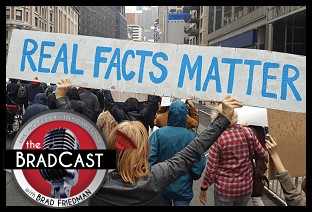 Media Conglomerates Continue Trump Capitulation: 'BradCast' 8/6/25
Media Conglomerates Continue Trump Capitulation: 'BradCast' 8/6/25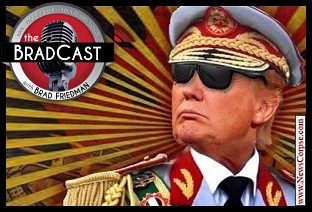 Banana Republican: Trump Shoots the Labor Statistics Messenger: 'BradCast' 8/5/25
Banana Republican: Trump Shoots the Labor Statistics Messenger: 'BradCast' 8/5/25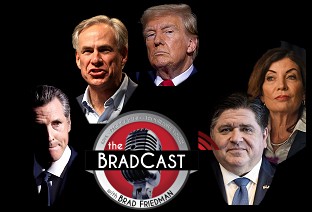 All's Fair in Love, War and, Apparently, Part-isan Gerrymandering: 'BradCast' 8/4/25
All's Fair in Love, War and, Apparently, Part-isan Gerrymandering: 'BradCast' 8/4/25 The Art of the Corrupt, Phony, Unlawful, Pretend Trade Deal: 'BradCast' 7/31/25
The Art of the Corrupt, Phony, Unlawful, Pretend Trade Deal: 'BradCast' 7/31/25 Battle Begins Against Trump EPA Climate Regulations 'Kill Shot': 'BradCast' 7/30/25
Battle Begins Against Trump EPA Climate Regulations 'Kill Shot': 'BradCast' 7/30/25 A Pu Pu Platter of Trump Corruption: 'BradCast' 7/29/25
A Pu Pu Platter of Trump Corruption: 'BradCast' 7/29/25 'Catastrophic' GOP Cuts to Medicaid, Medicare, ACA: 'BradCast' 7/28/25
'Catastrophic' GOP Cuts to Medicaid, Medicare, ACA: 'BradCast' 7/28/25
 VA GOP VOTER REG FRAUDSTER OFF HOOK
VA GOP VOTER REG FRAUDSTER OFF HOOK Criminal GOP Voter Registration Fraud Probe Expanding in VA
Criminal GOP Voter Registration Fraud Probe Expanding in VA DOJ PROBE SOUGHT AFTER VA ARREST
DOJ PROBE SOUGHT AFTER VA ARREST Arrest in VA: GOP Voter Reg Scandal Widens
Arrest in VA: GOP Voter Reg Scandal Widens ALL TOGETHER: ROVE, SPROUL, KOCHS, RNC
ALL TOGETHER: ROVE, SPROUL, KOCHS, RNC LATimes: RNC's 'Fired' Sproul Working for Repubs in 'as Many as 30 States'
LATimes: RNC's 'Fired' Sproul Working for Repubs in 'as Many as 30 States' 'Fired' Sproul Group 'Cloned', Still Working for Republicans in At Least 10 States
'Fired' Sproul Group 'Cloned', Still Working for Republicans in At Least 10 States FINALLY: FOX ON GOP REG FRAUD SCANDAL
FINALLY: FOX ON GOP REG FRAUD SCANDAL COLORADO FOLLOWS FLORIDA WITH GOP CRIMINAL INVESTIGATION
COLORADO FOLLOWS FLORIDA WITH GOP CRIMINAL INVESTIGATION CRIMINAL PROBE LAUNCHED INTO GOP VOTER REGISTRATION FRAUD SCANDAL IN FL
CRIMINAL PROBE LAUNCHED INTO GOP VOTER REGISTRATION FRAUD SCANDAL IN FL Brad Breaks PA Photo ID & GOP Registration Fraud Scandal News on Hartmann TV
Brad Breaks PA Photo ID & GOP Registration Fraud Scandal News on Hartmann TV  CAUGHT ON TAPE: COORDINATED NATIONWIDE GOP VOTER REG SCAM
CAUGHT ON TAPE: COORDINATED NATIONWIDE GOP VOTER REG SCAM CRIMINAL ELECTION FRAUD COMPLAINT FILED AGAINST GOP 'FRAUD' FIRM
CRIMINAL ELECTION FRAUD COMPLAINT FILED AGAINST GOP 'FRAUD' FIRM RICK SCOTT GETS ROLLED IN GOP REGISTRATION FRAUD SCANDAL
RICK SCOTT GETS ROLLED IN GOP REGISTRATION FRAUD SCANDAL VIDEO: Brad Breaks GOP Reg Fraud Scandal on Hartmann TV
VIDEO: Brad Breaks GOP Reg Fraud Scandal on Hartmann TV RNC FIRES NATIONAL VOTER REGISTRATION FIRM FOR FRAUD
RNC FIRES NATIONAL VOTER REGISTRATION FIRM FOR FRAUD EXCLUSIVE: Intvw w/ FL Official Who First Discovered GOP Reg Fraud
EXCLUSIVE: Intvw w/ FL Official Who First Discovered GOP Reg Fraud GOP REGISTRATION FRAUD FOUND IN FL
GOP REGISTRATION FRAUD FOUND IN FL

































